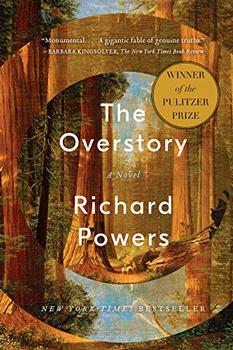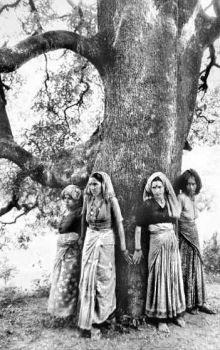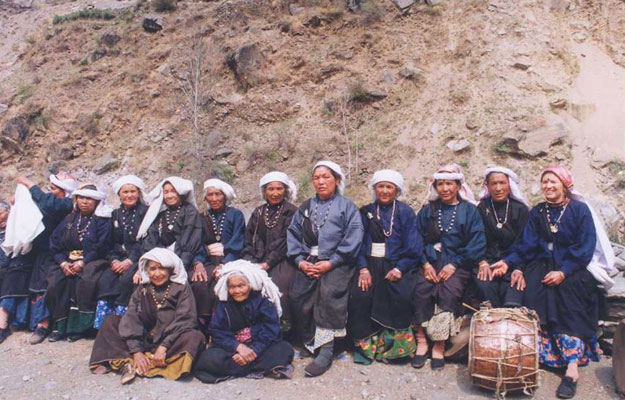Summary | Excerpt | Reading Guide | Discuss | Reviews | Beyond the Book | Read-Alikes | Genres & Themes | Author Bio

A Novel
by Richard PowersThis article relates to The Overstory
 In The Overstory, a few of the characters become environmental activists in order to save the wealth of forests in the American West and Pacific Northwest. In the novel, Richard Powers refers to many save-the-trees efforts around the globe, including the Chipko Andolan in the 1970s in the Himalayan region of India.
In The Overstory, a few of the characters become environmental activists in order to save the wealth of forests in the American West and Pacific Northwest. In the novel, Richard Powers refers to many save-the-trees efforts around the globe, including the Chipko Andolan in the 1970s in the Himalayan region of India.
Chipko Andolan literally translates to Stick (as in cling) Protest, as the mostly women who took part in the struggle against logging companies stood their ground by wrapping their arms around the trees that were scheduled to be felled.
The Chipko Andolan was born in the northern Indian state of Uttar Pradesh (the region of the Himalayas where it originated is now part of a new state, Uttarakhand). India and China went to war in the early '60s. An extensive network of roads giving access to the rugged forests at the foothills of the world's tallest mountain range, the Himalayas, was a leftover from this conflict. Over the next decade, the region saw logging companies rapidly depleting tree cover to a dangerous extent. Devastating floods and landslides became increasingly common.
 Equally worrisome, the local inhabitants had no say in how their land was being apportioned. A rural scheme that promised cottage industries to small communities in the region gave residents access to a few trees every year so they could use them to create farming tools for sale. It was when the government denied the locals access to three ash trees and, instead, granted an inland logging company permission to fell hundreds of trees for sporting goods that the seed for rebellion was sown. Local residents protested in droves, beating drums and other equipment, and driving the companies away.
Equally worrisome, the local inhabitants had no say in how their land was being apportioned. A rural scheme that promised cottage industries to small communities in the region gave residents access to a few trees every year so they could use them to create farming tools for sale. It was when the government denied the locals access to three ash trees and, instead, granted an inland logging company permission to fell hundreds of trees for sporting goods that the seed for rebellion was sown. Local residents protested in droves, beating drums and other equipment, and driving the companies away.
 Predictably, the proceedings escalated to a game of whack-a-mole with loggers and residents staring each other down in different villages in Uttar Pradesh. Women activists from villages all over this region adopted Gandhian principles of satyagraha (non-violence) and clung to trees by the dozens, refusing to budge, taking turns defying the Goliath. The Chipko Andolan was in full swing in 1973. The activists began winning the fight, which further emboldened them. The movement won another shot in the arm when then Chief Minister (the equivalent of Governor) of the state took up the cause and set up a committee to explore the matter, which ruled in favor of the activists. Prime Minister Indira Gandhi eventually passed a law to ensure sustainable logging in the area, although threats to the edict continue to surface.
Predictably, the proceedings escalated to a game of whack-a-mole with loggers and residents staring each other down in different villages in Uttar Pradesh. Women activists from villages all over this region adopted Gandhian principles of satyagraha (non-violence) and clung to trees by the dozens, refusing to budge, taking turns defying the Goliath. The Chipko Andolan was in full swing in 1973. The activists began winning the fight, which further emboldened them. The movement won another shot in the arm when then Chief Minister (the equivalent of Governor) of the state took up the cause and set up a committee to explore the matter, which ruled in favor of the activists. Prime Minister Indira Gandhi eventually passed a law to ensure sustainable logging in the area, although threats to the edict continue to surface.
The Chipko Andolan was significant – and not just because David won over Goliath by adopting a simple non-violent strategy. With the help of additional heavyweights such as the Chief Minister and activist leadership including many women, the movement was also effective in instituting laws that gave residents first dibs in local contracts and brought up other issues affecting the mountain people, including fair wages and access to jobs. The Chipko Andolan is repeatedly referenced as a model by which people who had otherwise no agency, in this case, women, made inroads in a fight they seemingly had little chance of winning.
Chipko movement
Participants of the first all-woman Chipko action at Reni village in 1974, reassembled thirty years later.
Tribute to the Chipko movement in Poland, courtesy of www.thehindu.com
Filed under People, Eras & Events
![]() This "beyond the book article" relates to The Overstory. It originally ran in April 2018 and has been updated for the
April 2019 paperback edition.
Go to magazine.
This "beyond the book article" relates to The Overstory. It originally ran in April 2018 and has been updated for the
April 2019 paperback edition.
Go to magazine.
Your guide toexceptional books
BookBrowse seeks out and recommends the best in contemporary fiction and nonfiction—books that not only engage and entertain but also deepen our understanding of ourselves and the world around us.